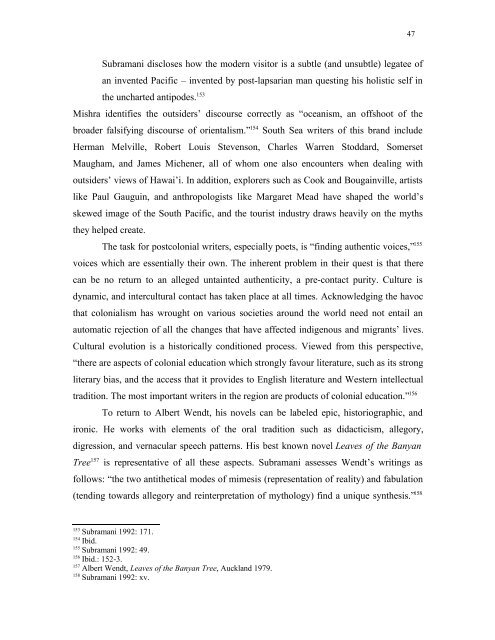A Paradise Lost - KOPS - Universität Konstanz
A Paradise Lost - KOPS - Universität Konstanz
A Paradise Lost - KOPS - Universität Konstanz
You also want an ePaper? Increase the reach of your titles
YUMPU automatically turns print PDFs into web optimized ePapers that Google loves.
Subramani discloses how the modern visitor is a subtle (and unsubtle) legatee of<br />
an invented Pacific – invented by post-lapsarian man questing his holistic self in<br />
the uncharted antipodes. 153<br />
Mishra identifies the outsiders’ discourse correctly as “oceanism, an offshoot of the<br />
broader falsifying discourse of orientalism.” 154 South Sea writers of this brand include<br />
Herman Melville, Robert Louis Stevenson, Charles Warren Stoddard, Somerset<br />
Maugham, and James Michener, all of whom one also encounters when dealing with<br />
outsiders’ views of Hawai’i. In addition, explorers such as Cook and Bougainville, artists<br />
like Paul Gauguin, and anthropologists like Margaret Mead have shaped the world’s<br />
skewed image of the South Pacific, and the tourist industry draws heavily on the myths<br />
they helped create.<br />
The task for postcolonial writers, especially poets, is “finding authentic voices,” 155<br />
voices which are essentially their own. The inherent problem in their quest is that there<br />
can be no return to an alleged untainted authenticity, a pre-contact purity. Culture is<br />
dynamic, and intercultural contact has taken place at all times. Acknowledging the havoc<br />
that colonialism has wrought on various societies around the world need not entail an<br />
automatic rejection of all the changes that have affected indigenous and migrants’ lives.<br />
Cultural evolution is a historically conditioned process. Viewed from this perspective,<br />
“there are aspects of colonial education which strongly favour literature, such as its strong<br />
literary bias, and the access that it provides to English literature and Western intellectual<br />
tradition. The most important writers in the region are products of colonial education.” 156<br />
To return to Albert Wendt, his novels can be labeled epic, historiographic, and<br />
ironic. He works with elements of the oral tradition such as didacticism, allegory,<br />
digression, and vernacular speech patterns. His best known novel Leaves of the Banyan<br />
Tree 157 is representative of all these aspects. Subramani assesses Wendt’s writings as<br />
follows: “the two antithetical modes of mimesis (representation of reality) and fabulation<br />
(tending towards allegory and reinterpretation of mythology) find a unique synthesis.” 158<br />
153 Subramani 1992: 171.<br />
154 Ibid.<br />
155 Subramani 1992: 49.<br />
156 Ibid.: 152-3.<br />
157 Albert Wendt, Leaves of the Banyan Tree, Auckland 1979.<br />
158 Subramani 1992: xv.<br />
47

















